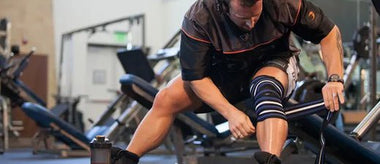Do You Need Knee Sleeves For Lifting? | The Ultimate Guide
-William Gainzespear
Alright, I may have made that quote up, but I’ll get right to the point -- here’s the short answer on whether you need knee sleeves for lifting:
Do you need knee sleeves in order to squat big weights? No.
Do knee sleeves protect you from future injury? Yes.
Knee sleeves provide compression to the knee joint that improves blood flow and reduces pain. Although they provide some support, the real benefit is in the compression and heat retention around the joint capsule.
Knee sleeves also help with knee proprioception, as many people report improved awareness of where their knees are in relation to their hips and their ankles while wearing knee sleeves compared to those who don’t. This is really important when you squat because the squat is a highly technical lift.
Basically, knee sleeves improve the awareness of your technique and reduce the likelihood of injury while lifting. For as cheap as they are I find it amazing that more people aren’t wearing them.

What is a knee sleeve?
Knee Sleeves were created to provide the knee joint with moderate compression in order to keep them warm and “safe”. Obviously, they can’t protect you from being an idiot and squatting 200kg without any warm-up sets, though. Most knee sleeves are made out of neoprene. So are Gunsmith Fitness knee sleeves.
The only difference is that ours are made out of SCR premium 7mm thick Neoprene rather than the cheaper SBR Neoprene used in the majority of knee sleeves.
Regardless of your goals as a lifter, I highly recommend knee sleeves if you have the cash available.
If you size them appropriately, they add nothing to your lifts, but they will keep your knees warm, preventing tendonitis and other annoying issues that often crop up with creaky joints.
I used to have semi-regular pain in both knees during and after squatting. This mostly occurred in between heavy sets as I’d get cold or directly after workouts while I cool down. Sleeves fixed both issues.
What's the difference between 7mm and 9mm knee sleeves?
Thickness:
First up 7mm are obviously thinner compared to 9mm ones. They provide moderate compression and support to the knee joint without being overly restrictive.
9mm are the big boys, these sleeves are thicker and offer increased compression and support compared to 7mm. The extra thickness provides more stability to the knee joint.
Compression and Support:
7mm offers decent compression, suitable for various activities like weightlifting or CrossFit. They strike a nice balance between support and flexibility.
9mm provide higher levels of compression and support. They're often preferred for heavy lifting, powerlifting, or activities that demand more significant joint stability.
Intended Use:
7mm are more versatile and can be used across a broader range of activities. They're suitable for individuals looking for moderate support during workouts without feeling excessively constrained.
9mm is moving to hardcore territory, primarily designed for powerlifters, individuals engaging in heavy squats, or those requiring maximal knee support during intense workouts. They're favored in strength training scenarios where additional joint stability is crucial.
Mobility and Comfort:
7mm offers slightly more flexibility and ease of movement, which could be preferred for activities requiring agility or a broader range of motion.
9mm might limit some mobility or flexibility compared to 7mm sleeves. However, this trade-off might be acceptable for those seeking maximum support and stability.
Difference between a knee sleeve and a knee brace
There is a key difference to understand between knee braces and knee sleeves. The protective cushioning of the knee brace is meant to protect the anterior (front) knee and patella, which provides a lot of ligament support. Knee sleeves do this as well but only minimally.
If you have an unstable knee and are using a knee sleeve to fix or stabilize the knee, it probably won’t work. If you have serious knee pain or mobility issues you need to visit your doctor or orthopedic surgeon and look into the matter further. Knee sleeves are like preventative medicine. Knee braces are post-injury. See the difference?
Difference between knee sleeves and knee wraps
Depending on what type of gym you belong to you probably don’t see a ton of knee wraps. Knee wraps are not nearly as common as knee sleeves for the simple fact that they are more intrusive and have less application for most lifters.
Here’s why:
Knee wraps allow more weight to be lifted in the squat. This is not true for knee sleeves which give a 1-3% increase AT MOST.
Why is that?
During the eccentric (downwards) phase of the squat, the tightness of the knee wraps make the knee harder to bend, which makes them elastic at the bottom of the squat (the hole) which creates a slingshot effect that is released during the concentric (upwards) phase -- resulting in heavier and faster squats.
Now, at this point I know what you’re thinking: “If knee wraps make my squat go up and knee sleeves don’t, why shouldn’t I use knee wraps?”
The disadvantage of knee wraps is that they don’t actually improve your squat. They are bulky and restrictive in nature, much like a knee brace, and due to the fact that they completely cover the patella (kneecap) they actually push the knee into the thigh bone, which increases friction.
While they might help a powerlifter squatting huge weights to keep his rectus femoris attached to his knee, it won’t help the average gym goer, and could actually hinder the progress of someone who does not have their squat form dialed in.
But for powerlifters, quadriceps tears are a common injury from squatting and knee wraps may help reduce the risk of that injury.
Many powerlifting organizations also allow their use in competition so if you’re going to compete in geared lifts you actually need to be using knee wraps.

How healthy are most people’s knees?
According to the statistics, not very.
Nearly half of American adults develop knee osteoarthritis in their lifetime and one in twenty Americans already has an artificial knee. The statistics for athletes must be even higher from the constant stress of running, jumping, and lifting heavy things. Here at Gunsmith Fitness, we believe that a strong knee is a healthy knee, but you can’t get around the fact that lifting progressively heavier loads grinds the kneecap onto itself.
Do you really need knee sleeves?
If you’re new to squatting and have never felt knee pain in your life then you can probably skip the knee sleeves. But if you’ve been lifting for awhile and have a respectable squat then I have no doubt that you can benefit from knee sleeves. That said, if you only have a few quid and you can’t have everything, you can consider other gear depending on where you need the most support.
Other ways to solve knee problems
Now, knee selves aren't the only way to solve knee problems. You can also take a more holistic approach:
-
Water
This is going to sound ridiculous but a lot of people have joint problems based on the fact that they do not drink enough water. It’s crazy that it could be so simple -- but it makes sense because for joints to move smoothly they need to be lubricated. If your body doesn’t have enough fluid it will allocate that resource away from the joints.
I discovered this after reading that Jujimufu, the weighted chair splits guy, drinks around two gallons of water a day to make sure that his joints are able to handle all of the crazy flexibility, strength, and acrobatic stunts that he pulls off.
It will feel uncomfortable at first, and you will have to get up to pee more often, but we sit too much anyway!
-
Glucosamine
Supplements that contain glucosamine HCI have been clinically proven to reduce pain and inflammation from arthritis. I don’t take it since my joints feel great already (an ounce of prevention is worth a pound of cure) but believe it or not, my dog takes it. A lot people swear by the stuff so that’s one road you can go down.
**note: it will cost more over the long term than wearing knee sleeves.
Pros and Cons of Knee Sleeves
Pros
- Compression
- Increased blood flow
- Faster recovery
- Reduced pain
- Improved proprioception
- Least intrusive method of knee support
Cons
- Not robust enough for already injured knees
- Minimal effect on actual load lifted
- Possible placebo effect

Do You Need Knee Sleeves For Lifting? | The Ultimate Guide
Although some people would benefit more from using knee sleeves than others, there is zero risk involved in wearing them and there is a lot to gain. You can squat more weight, safer, with better form AND look fit while you’re doing it. Plus, the ability to stay injury-free is the biggest benefit of all!





